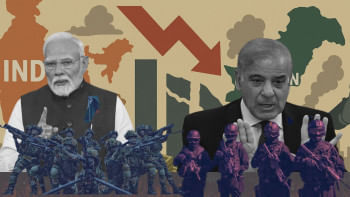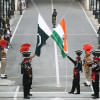India-Pakistan tensions and the risks of war

Two weeks after the terror attacks in Pahalgam, India-administered Kashmir, India launched missiles into Pakistan-administered Kashmir and Pakistan under "Operation Sindoor," described as a precision strike. At the time of writing, India and Pakistan have polar opposite claims regarding the strikes. From Pakistan's perspective, Indian strikes have killed 26 people, including a child, as reported by The Guardian and Reuters. On the other hand, the Indian government said in a statement that attacks were directed at nine non-military targets, and "terrorist infrastructure."
It is too early, and rather preliminary, to conclude that India-Pakistan tensions have escalated to a "war." But it is also impossible to rule out further escalations, and that uncertainty is what makes the current situation all the more concerning.
The scale of the attacks has surpassed historical precedence where the tit-for-tat exchanges did not result in a wider war. Prior to Indian strikes on Wednesday, Indian Prime Minister Narendra Modi had announced on Tuesday, without specifically mentioning Pakistan, that India's water will flow and "be conserved for India's benefit." Withdrawing from the 65-year-old Indus Water Treaty has been India's fiercest diplomatic offensive in response to the Pahalgam attacks, and Pakistan has vowed that any attempt by India to stop water flow would constitute "an act of war."
Pakistani military spokesperson Lieutenant General Ahmed Sharif Chaudhry, in an early morning news conference, said Indian missiles targeted four locations in Punjab, and two in Pakistan-administered Kashmir. Pakistan's Ministry of Foreign Affairs said it summoned the Indian chargé d'affaires in Islamabad, and stated that India's "blatant act of aggression constitutes a clear violation of Pakistan's sovereignty. Such actions are in contravention of the UN Charter, international law and established norms governing inter-state relations," as reported by CNN. India has not yet publicly provided evidence of the claims that Pakistan was directly linked to the terror attacks in Pahalgam, to justify Wednesday's attacks on the premise of self-defence under Article 51 of the UN Charter.
Retaliating to the Indian strikes, Pakistan has already launched heavy artillery shelling along the de facto border between the two nations, reports BBC. India has claimed the artillery shelling along the de facto border is unprovoked.
At least 12 people were killed and dozens wounded on the Indian side in Poonch, local government official Azhar Majid told AFP. Pakistan has also claimed it has shot down five Indian Air Force jets—including a Rafale jet—and a drone. A weapons researcher, Trevor Ball, of Armament Research Services, analysed witness photos from a wreckage site in the village of Wuyan in India-administered Kashmir, and said the tank was likely from a Rafale or Mirage fighter jet, as reported by The New York Times. Though facts and verifications are yet to emerge, both nations' responses have surpassed previous "non-escalatory" boundaries. Before Pakistan's artillery shelling, South Asia analyst Michael Kugelman told AP News that India and Pakistan "are two strong militaries that, even with nuclear weapons as a deterrent, are not afraid to deploy sizable levels of conventional military force against each other."
The two nations have had flare-ups over Kashmir, and patterns and predictability are important. The Indian airstrikes do not come as a surprise, and neither does the Pakistani response, so far as the actions follow threats both nations have exchanged since the Pahalgam terror attacks. Initially, the response to Pahalgam bore parallels to the Pulwama bombings of 2019, which killed 40 Indian security personnel. Twelve days after the Pulwama bombings, India had launched airstrikes in Pakistan, but according to analysts, the previous military responses in 2019 and 2016 (Uri) were more measured. Asfandyar Mir, a senior fellow in the South Asia Program at the Stimson Center in Washington, told The New York Times that the Indian strikes under Operation Sindoor so far "have crossed two significant thresholds in its military action," by hitting a large number of sites in Pakistan and by striking Punjab. Pakistan's military claims that Indian strikes have hit the densely populated province of Punjab, and are the deepest India has struck inside Pakistan since 1971, according to CNN.
The role of powerful nations who would act as mediators, and with whom both nations share relations—namely the US—is key. JD Vance had suggested they would support an Indian "response" that would not lead to a larger conflict in the region. One could infer that Vance's statement suggests supporting a kinetic response that would not be overly escalatory. After the overnight strikes, the Indian army posted a video on X, saying "Justice is served." According to The New York Times, India has said its military actions have been "measured, responsible and designed to be non-escalatory in nature." At the White House, US President Trump has so far called the escalation between India and Pakistan a "shame," and said he hoped "it ends very quickly." Trump had said earlier that both are "friends" of the US. The UN, Western nations, and China stepped up the calls for restraint for both nations.
Beyond statements, the current escalation requires active engagement and mediation. The rapid escalation has gone far, and renegotiating the Indus Water Treaty, rather than calibrated "responses," must be encouraged by geopolitical actors already navigating two wars and a Cold War between China and the US, with heightening tensions.
Ultimately, a protracted conflict harms both countries. On May 5, Moody's stated that a persistent increase in tensions with India could impair Pakistan's access to external financing and pressure its foreign exchange reserves, which remain well below what is required to meet its external debt payment for the next few years. For India, a full-scale war with Pakistan threatens its geopolitical position in the Indo-Pacific policy, as a net security provider in the region. "An outright war with Pakistan… would only indirectly put us [India] against China, one of the world's largest economies… which has strategic investments in the Belt and Road Corridor that runs through Pakistan," writes Saba Naqvi, a Delhi-based journalist, in an article in Frontline magazine.
Time and time again, history has shown that wars exact a price. Further military actions from either nation can no longer be rationalised by their governments' need to "save face" and flex muscle power to their rival in order to tend to their domestic audience. Both nations stand to lose more than they would gain with outright war, and realising that sooner rather than later would serve their people.
Ramisa Rob is Geopolitical Insights Editor at The Daily Star.
Views expressed in this article are the author's own.
Follow The Daily Star Opinion on Facebook for the latest opinions, commentaries and analyses by experts and professionals. To contribute your article or letter to The Daily Star Opinion, see our guidelines for submission.


 For all latest news, follow The Daily Star's Google News channel.
For all latest news, follow The Daily Star's Google News channel. 









Comments